Suppose you’re binge-watching your favorite TV show, while digging into a tub of salted caramel ice cream, and everything seems normal and perfect. But then suddenly, out of the blue, you start to feel as if your reality is unraveling, like a rogue thread from a well-worn sweater? Let me tell you, this maybe one of many psychotic episode signs.
You might be thinking, “wait a minute, psychotic?” I know these words may sound a bit intimidating and scary, but stick around for a while and I will explain everything. This article is going to do a deep dive in the major psychotic episode signs, causes of psychosis, the different types of psychosis, and also, what is a psychotic episode.
So, are you ready to navigate this uncharted territory? Let’s get started then. First let’s talk about what is a psychotic episode.
Related: Coping With Postpartum Psychosis: What New Mothers Need To Know
What Is A Psychotic Episode?
A psychotic episode is like a storm in the mind, where your thoughts, perceptions and emotions, become distorted, making it hard for you to distinguish between reality and imagination.
During a psychotic episode, you may experience hallucinations (seeing or hearing things that aren’t there) or have delusions (strongly held beliefs that are not based in reality). These experiences can be really disorienting and frightening, which can affect your behavior and ability to function in daily life.
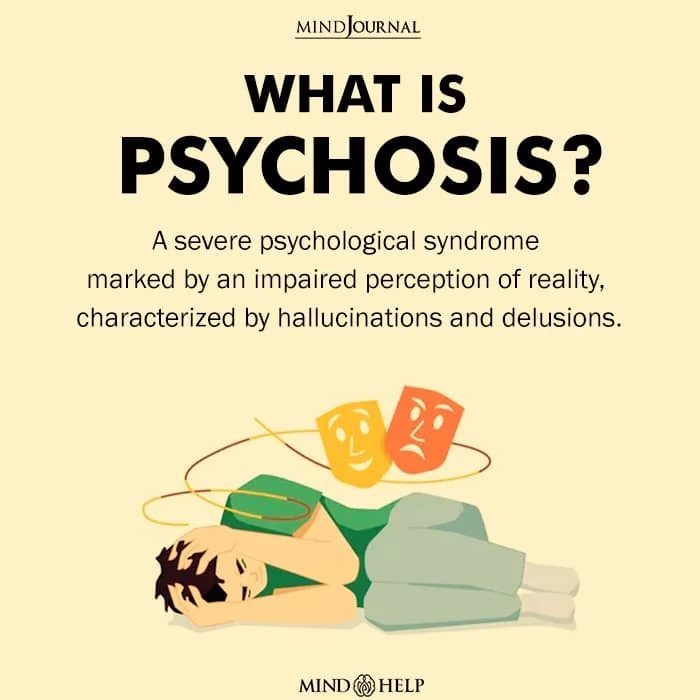
Okay, now that we know what is a psychotic episode, let’s talk about the different types of psychosis.
Types Of Psychosis
- Schizophrenia: This is a type of mental disorder when you suffer from hallucinations, delusions, erratic thinking patterns and emotional irregularities, that primarily emerge during late adolescence or early adulthood.
- Substance-induced Psychosis: This type of psychosis happens with drugs that are hallucinogens or stimulants. Such psychotic episodes usually appear during substance administration or during withdrawal.
- Brief Psychotic Disorder: One of the most interesting types of psychosis, this is a temporary circumstance that leads you to suffer through short-lived episodes of psychosis, due to traumatic incidents or serious stressors. This usually lasts for less than a month.
- Hallucinations: This makes your brain react in ways, as if real experiences are happening, when they are not. For example, you may hear voices that are not there or see things that don’t exist.
- Delusions: When you have delusions, you tend to strongly believe in false information, despite having contradictory evidence. You believe certain things are happening when they are not.
- Shared psychotic disorder (also called folie à deux): Again, one of the most interesting types of psychosis is this. This happens when one person in a relationship is delusional, and their partner adopts it too. That’s why it’s known as shared psychosis.
- Schizoaffective disorder: People who suffer from this condition tend to display symptoms of both schizophrenia and a mood disorder, like bipolar disorder or depression.
- Psychosis due to a medical condition: Symptoms such as false beliefs, hallucinations may appear due to another illness that affects your brain function like a brain tumor or head injury.
Now that we have talked about the types of psychosis, let’s talk about the causes of psychosis.
Causes Of Psychosis
- Schizophrenia
- Delusional disorder
- Bipolar disorder
- Substance/medication-induced psychotic disorder
- Schizoaffective disorder
- Schizotypal (personality) disorder
- Depression
- Postpartum psychosis
- Lyme disease
- Alzheimer’s disease
- Dementia
- Lupus
- Multiple sclerosis
- Serious head injury
- High levels of anxiety and stress
- Traumatic experiences
- Substance abuse such as alcohol abuse, drug use, including prescription medicines
Related: Everything You Need To Know About Bipolar Disorder
Now that we know the types of psychosis and the causes of psychosis, let’s finally talk about psychotic episode signs.
7 Major Psychotic Episode Signs You Should Know
1. You suffer from distorted perception.
One of the major psychotic episode signs is your altered perception; during a psychotic episode, your mind changes your understanding of reality. You might see things that other’s don’t, hear voices only you can hear, or feel sensations that have no external cause.
These hallucinations can be incredibly intense making it hard for you to distinguish between what is truly happening, and what exists only within the confines of your mind.
2. You feel increasingly paranoid.
Paranoia takes hold during a psychotic episode, which can make you suspect your surroundings, and even the interactions you engage in. You may feel as if others are conspiring against you, or scheming with malicious intent in their hearts.
This leads to heightened vigilance, constantly scanning for signs of danger, and interpreting innocent actions as threats. Gradually, your mind becomes a breeding ground for suspicion, and distorted perception of reality, which causes you to feel permanently fearful of everything and everyone around you.
3. You have delusions.
Delusions are considered to be one of the most important hallmarks of a psychotic episode. When you experience delusions, you tend to cling to irrational convictions, even when you are provided with contradictory evidence.
Delusions can take various forms, such as grandiose delusions, where you believe that you possess extraordinary powers or significance, or paranoid delusions, where you feel targeted and manipulated by unseen entities.
These distorted beliefs ultimately shape your perception of reality, and heavily influences your actions, thoughts and interactions.
4. You show signs of emotional instability.
One of the biggest psychotic episode signs is emotional instability. You may find yourself switching from feelings of euphoria and elation, to depths of despair and sadness, all in the blink of an eye.
Your mood swings are very intense and rapid, but are disconnected from external causes. You may also feel agitated and irritable, making it even harder for you to navigate your emotions and maintain healthy personal relationships.
Related: 12 Signs Of An Emotionally Unstable Person To Watch Out For
5. You suffer from disorganized thinking.
Disorganized thinking basically transforms your coherent thoughts into a fragmented puzzle. You may find it hard to communicate with people, and switch from one topic to another every minute.
It becomes hard for others to follow your train of thought, as your opinions and thoughts increasingly become more jumbled and disjointed. Because of this, it’s quite a challenge for you to have meaningful conversations, express yourself properly and even organize your thoughts.
6. Your sleep schedule and sleep patterns are disrupted.
One of the subtle psychotic episode signs is this; insomnia becomes your best friend, and your most clingy friend. Your normal sleep routine goes for a toss, and you find yourself tossing and turning all night long.
On the other hand, in some cases, you end up sleeping so much that you forget what day it is. Such a disrupted sleep pattern takes a toll on your mental and emotional well-being and exacerbates your fragile mental state.
7. Your speech increasingly becomes incoherent.
When you are in the midst of a psychotic episode, you may notice that your speech is becoming incoherent and it’s going off the rails. The sentences that you were speaking so clearly and smoothly, are now coming out in a very unclear manner.
You find yourself veering off into tangents that have no connection to the topic at hand, and the conversation seems to have turned into a jigsaw puzzle of unrelated and nonsensical pieces.
One of the major psychotic episode signs, incoherent speech makes it challenging for you to have proper conversations with people.
Related: This Is What A Personality Disorder Really Looks Like: Symptoms To Watch Out For
Takeaway
The psychotic episode signs that we talked about here, along with the types and causes of psychosis may not be definitive proof of a psychotic episode. If you feel like you are experiencing any of these things or most of these things, then it’s essential to seek professional help for proper evaluation and support.
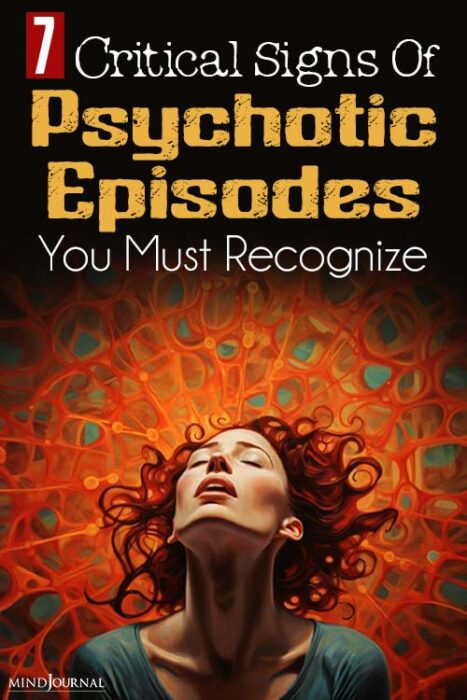
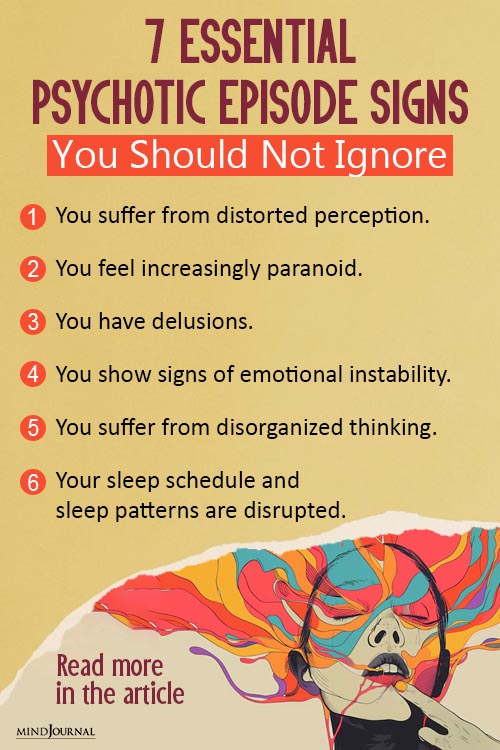

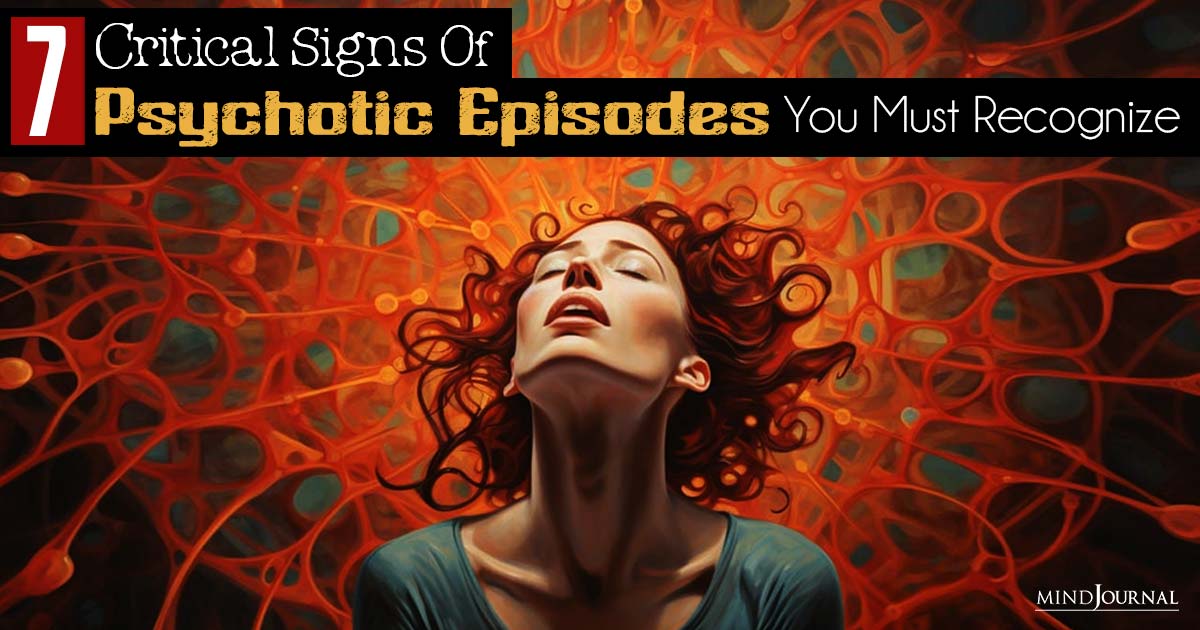






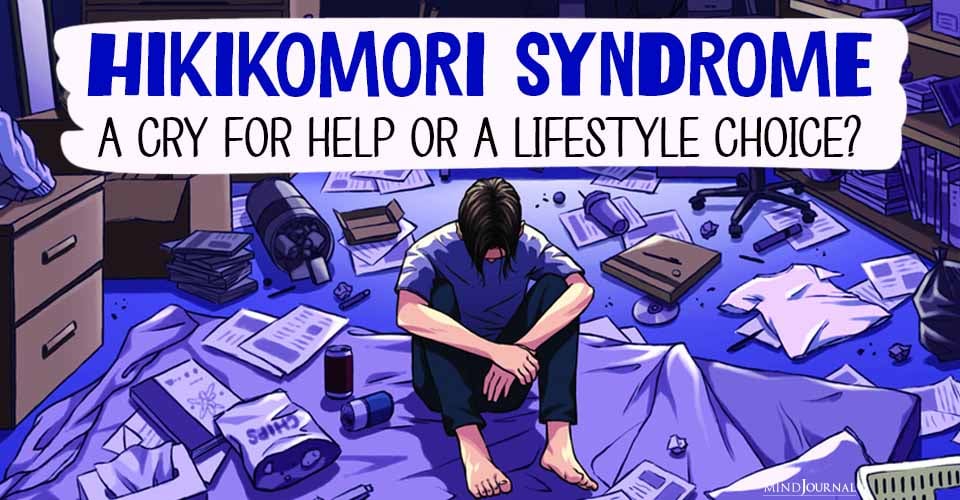
Leave a Reply